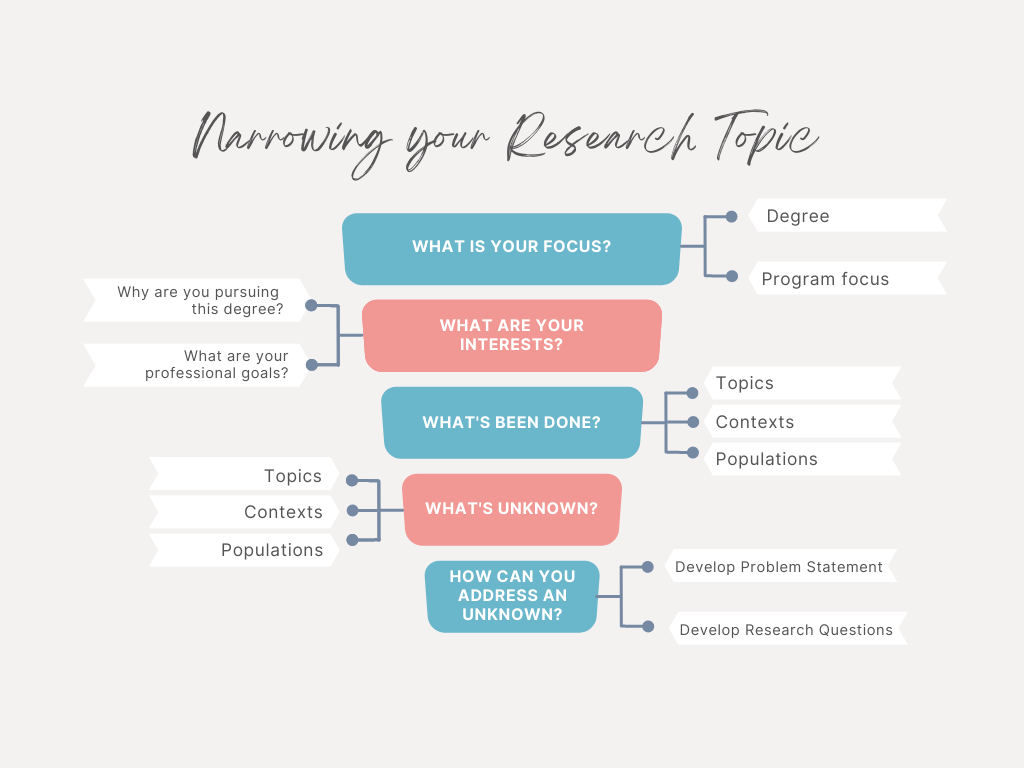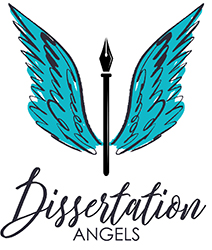The topic of your dissertation is a big deal. Generally, your dissertation topic is a subject you’ll eat, breathe, and sleep for at least a year. I often speak with candidates at the beginning of their dissertation writing journeys who feel completely overwhelmed by the task of deciding what they’re going to write about. For some, the struggle is a less delicious version of a kid in a candy store — staring at all the possibilities and struggling to make a decision. For others, the candy store shelves seem empty and they don’t know where to even begin.
This post is for anyone feeling stumped in the search for a dissertation topic. Let’s drill it down, discover your interests, how to align those interests with your program, and ensure your topic adds something new to the existing literature.
Pour yourself a cup of coffee (or tea!) and let’s get situated.
The funnel approach to developing your dissertation topic
Think of dissertation topic selection as a funnel, moving from the broad to the specific. As shown in the figure below, use five questions to guide this process of locating and fine-turning your topic:
- What is my focus?
- What are my interests?
- What’s been done?
- What’s unknown? and
- How can I address one of those unknowns?

What’s your focus?
The most important thing to consider when developing your dissertation topic is alignment with your degree program. This may seem like a no-brainer, but it’s possible for your interests and ideas to stray from your degree focus when you’re trying to pick a topic.
Years ago, a student came to me in hysterics because she had written her entire proposal and received her chair’s blessing. But when the program director read the project, she rejected it for poor alignment with her degree program. The topic wasn’t completely unrelated, but it was a stretch.
I share this cautionary tale as a warning to make sure your topic is well aligned with your program, from the start. It can be really difficult (and disheartening) to revise a topic to fit your program after you’ve already done substantial work.
After finding a topic that whets your whistle, check for alignment with your program. Make sure the alignment is obvious. Get feedback from others (students, professors, your chair, program dean, etc.) on your topic. Consider your program, degree, and area of focus.
What are you interests?

The next question to ask yourself when searching for your dissertation topic is, “What are my interests?” Your dissertation has the potential to be a powerful tool for your career development and personal marketing! After it’s finished, you can repurpose your dissertation for academic journals, mainstream publications, and books. You can also use your dissertation research to establish yourself as a thought leader. I often hear coaches, chairs, and other academics urge Ph.D. candidates that the topic isn’t that important… that, “the best dissertation is a done dissertation.” Okay, yes, we want you to finish. But sentiments like that minimize the potential of your research.
This is how I see it: You have to write a dissertation, right? Why not choose a topic that can be professionally levied after you graduate? What are your professional goals? Upon publication, you’ll appear as an expert on your chosen dissertation topic. Whether you want to go on to become a consultant, author, speaker, academic, corporate powerhouse, or nonprofit leader, consider ways to capitalize on your dissertation topic
What’s been done?
Once you’ve clarified your interests and future ways to leverage your dissertation, it’s time to survey the existing research. You want to get a clear idea of what kind of studies have been performed in your area. During your research, focus on the different topics, contexts, and populations of other investigations. Also consider the types of research, in terms of method, design, data collection, and analysis procedures. Develop a comprehensive understanding of what’s known and what has been recently (within the last 5 to 7 years) published.
What’s unknown?
Okay, now that you’ve explored existing research in your area of interest, it’s time to ask “what’s unknown?” Just as you surveyed topics, contexts, populations, method, design, data collection, and data analysis when exploring the existing research, consider how tweaks to these factors could create an unknown that you could address.
Let’s pretend you’re interested in how gender influences individuals’ pet preferences. Let’s say you located three studies very close to this exact topic.
- The first was conducted among college students in southeast Georgia. The researchers used online surveys to study whether gender differences existed in preferences for cats vs. dogs.
- The second was conducted in the Northeastern United states. Data were collected via interviews and the sample included adults over the age of 18.
- The third was conducted among elementary age children in a single school district in the Midwestern United States — data for this study were also collected via interview.
Okay, so looking at our three examples, we can see lots of gaps that can be addressed! We’re looking for holes in terms of sample, context, and method. You could conduct interviews or focus groups among college students in another location, examining gender differences in pet preference. Or you could expand the research to examine preferences for additional types of pets (birds, fish, snakes, etc.). You could conduct a nationwide online survey using a sample of adults, comparing gender-based preferences for pets. You could study pet preferences among children of other age groups. Or, you could see if gender-based preferences for pet type differ across age groups.
There are literally SO many holes. Don’t let identifying the research gap overwhelm you. Tiny tweaks to population, context, and method can reveal more gaps than you could tackle in a lifetime of research!
How can you address an unknown with your dissertation topic?

Finally, ask yourself, “How can I address one of these unknowns?” Choose one of the unknowns you identified in the previous step as your research topic. I recommend seeking feedback from your chair at this point so they’re on board with the direction you’re thinking.
Once you have the green light, develop your research question(s) and problem statement in alignment with the gap you’ve identified. Be sure to check out my article on defining your research scope to make sure you’ve narrowed your topic enough!
As always, happy writing!
